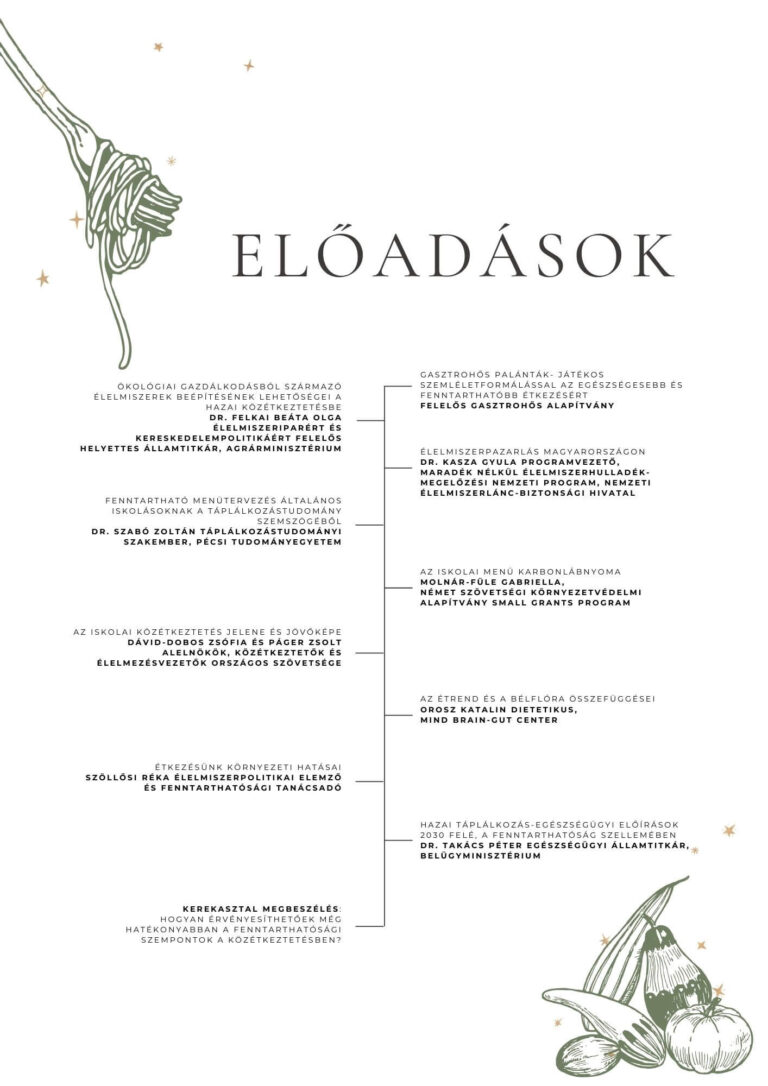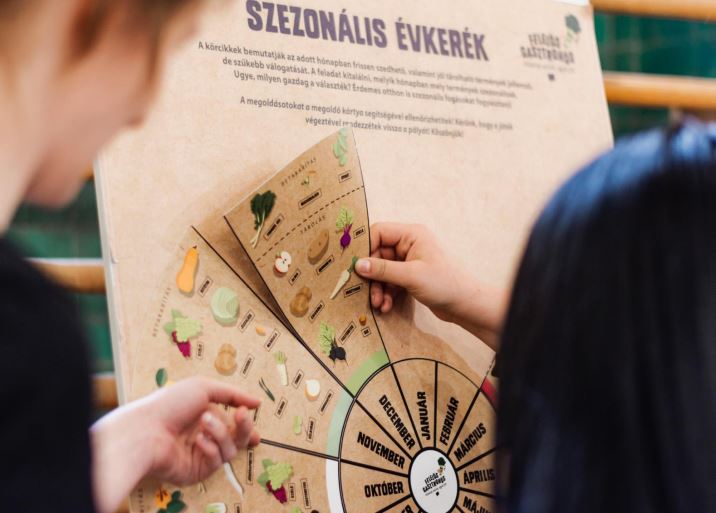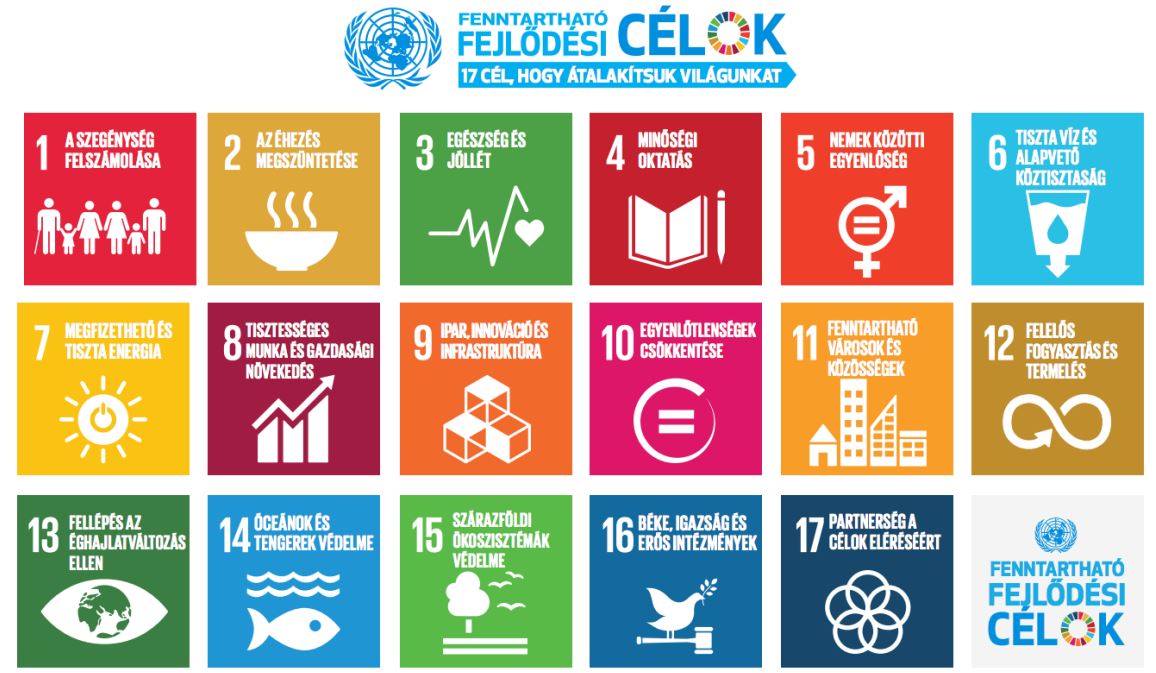
Mini-conference on sustainable public catering
A mini-conference on the implementation of sustainable public catering in Hungary was held on 17 January 2024 in Budapest. The conference was supported by the German Federal Foundation for the Environment (DBU, Deutsche Bundesstiftung Umwelt), the Csermely Environmental Association and the Responsible Gastro Foundation.
During the day-long programme, the participants were able to attend the following presentations:

All the speakers focused on improving and developing public catering, adapting it to the challenges of modern times, and on topics in their own fields, be it nutrition, health, environment, economics or even politics.
We have also compiled a short abstract of the presentations:
We must urgently find a way to transform our food systems to make food accessible to all and diets healthy and sustainable, as food production currently accounts for 26% of total GHG emissions. Agriculture also requires a lot of land and water, and most of the land under cultivation is used for livestock production (feed and livestock farming).

Réka Szöllősi, an independent food policy analyst and sustainability consultant, highlighted the problem of livestock farming, as the forest cover of our planet (26%) is already exceeded by the land needed for livestock production (27%), while only 7% of the planet’s land is used for growing crops for human consumption. Livestock farming also raises ethical and antimicrobial resistance issues. Our Western-style and domestic diets (average domestic meat consumption is 88 kg, making us the 5th largest meat consumer in Europe) are also clearly unsustainable.
One solution could be to switch to a plant-based diet, although the expert believes that a quicker solution is needed. Another solution could be the production of alternative proteins through precision fermentation and tissue culture of lab-grown meat.
Public catering can play a key role in transforming food systems, as it not only influences the eating habits of the younger generations, but also affects suppliers and the environmental impact of a single forward-looking change in public catering can be significant. There are already excellent international examples of this.
Dr. Beáta Felkai, Deputy State Secretary for Food Industry and Trade Policy of the Ministry of Agriculture, spoke about the possibilities of integrating food from organic farming into public catering. The Farm to Fork strategy has set firm sustainability targets, but it is difficult to move forward with regulations. The use of safe food is a priority for public catering. The use of products from short supply chains in public catering is required by law, with the aim of reducing the environmental footprint and supporting local producers. For this reason, price is not the basis for the award of a public tender. One of the 3 criteria for the evaluation is whether the food comes from controlled organic farming.
Dr. Gyula Kasza, head of the “No Leftovers” programme of the National Food Chain Safety Office, and the associate professor at the University of Veterinary Medicine, spoke about food waste in Hungary. We learned that 17% of the food produced globally ends up in the trash. 61% of this is generated in households. The problem is present in both developed and underdeveloped countries. The amount of food waste in our country is also measured and reported to the European Commission. Member States are obliged to do so, and Hungary has a food waste reduction programme. The “No Leftovers” initiative is very effective, mainly working with primary schools (e.g. in the form of lectures, drawing competitions), but also in secondary schools, where food waste prevention is included in the curriculum. In 2022, 59 million tonnes of food waste will be generated in the European Union, 55% of which will be generated in households (70 kg per capita). In our country, this figure is slightly lower (59.9 kg/person/year in 2022, down from 68 kg/year in the past), due to both inflation and a change in attitudes.
After a presentation by Gabriella Molnár-Füle from the German Federal Foundation for the Environment (DBU), who organised the mini-conference, she said that the conference was part of a project to make school meals more sustainable. To this end, the carbon footprint of a traditional menu and a sample menu was calculated for 1 portion per 5-5 days of main meals, courtesy of the KÖVET Association.
The sample menu was developed by Dr. Zoltán Szabó, Associate Professor at the Faculty of Health Sciences of the University of Pécs, so that each day would comply with the requirements of the Ministry of Human Resources Regulation on the nutritional health requirements for public catering. The carbon footprint of the essentially vegetarian menu varied according to the type and quantity of dairy products used, but was lower than that of the meat lunches. The carbon footprint of a purely plant-based lunch was the lowest (0.364 kg CO2 eq), which also meets the nutritional needs of children.
In addition to the calculation, Gabriella Molnár-Füle is also carrying out a questionnaire to find out how satisfied parents are with school meals and how sustainable and healthy they consider them to be. She is currently evaluating 141 responses.
The main conclusions are:
- the majority of parents would be willing to pay 10-25% more for a proven healthy, delicious and nutritious school canteen (currently the exact price of organic food);
- parents say that many children regularly miss lunch;
- they believe that more fruit and vegetables, using good quality ingredients and modern kitchen technology, would make school meals healthier
- the menu should be varied and nutritious;
- in addition to minimising sugary, sweet and processed foods, parents stressed the importance of local, seasonal ingredients and the absence of chemicals and additives.

Dr. Zoltán Szabó, lecturer at the University of Pécs, shed light on the nutritional side of sustainable menu planning. The role of public catering, in addition to providing meals, is to introduce healthy eating to the youngest generations. In his presentation, he cited studies published in international journals in which the authors point to the much higher GHG emissions associated with the production of animal-based foods compared to plant-based foods. The diet recommended by EAT-Lancet therefore calls for a global transformation to a predominantly plant-based diet as opposed to a Western-style diet.
Dr. Zoltán Szabó highlighted the excessive GHG emissions associated with red meat, especially beef. However, according to the relevant Ministry of Human Resources regulation, all main meals and, in the case of crèche and mini crèche meals, one of the small meals must also contain a protein source of animal origin. This regulation is not in line with the desire to link our diets to sustainability objectives. It is also a barrier to health, as the carcinogenicity of processed meat products has been known for many years and the link between red meat consumption and type 2 diabetes has been confirmed by several sources. The replacement of animal protein sources by plant sources has led to improved all-cause mortality data in research. Menu planning can also be made more sustainable under the Ministry of Human Resources regulation, e.g. by limiting foods of animal origin, by favouring non-traditional (or older) plant foods.
Katalin Orosz, a dietician at MIND Brain-Gut Center, gave a presentation on the relationship between gut flora and diet. This lecture was also of particular importance in the light of the fact that children’s fibre consumption is far below the recommendations and their intake of fruit and vegetables (especially in raw form) is very low. For children, therefore, the consumption of raw fibre, avoiding processed and ultra-processed foods, reducing red meat, regular physical activity and adequate amounts of good quality sleep are key to maintaining a healthy microbiome and gut barrier.
The meat-free campaign was launched in 2020 by the National Society of Conservationists (MTVSZ), which was reported by Szilvia Sándor Kapitányné. The health background to the initiative is that according to the 2019 National Nutrition and Dietary Status Survey, 77% of Hungarian men and 60% of women are overweight. According to the WHO COSI survey for children, also conducted in 2019, 24% of 6-8 year olds were overweight or obese (14% overweight, 10% obese), 64% were normal and 13% were undernourished. In addition to a sedentary lifestyle and poor sleep quality, an inadequate diet plays a role. Environmental concerns include the significant GHG emissions from livestock production, the large land requirements, the huge water footprint, ethical considerations and manure storage problems.
The National Association of Caterers and Food Service Managers supported their initiative, taking a role in promoting the one meat-free day a week initiative. Public catering is of particular importance, as many portions are prepared, and parents and teachers can be reached by raising awareness among young people. The Hungast Group introduced the one meat-free day a week in April 2023, which means 125,000 portions of food. In addition, it has been introduced in several municipalities and other operators are planning to introduce it.

Zsófia Dávid-Dobos, Vice President for Nutrition, Health and Dietetics of the Hungarian Public Health Service by KÖZSZÖV, spoke about the present and future of public catering. She said that in the decades since the establishment of public catering, our food environment, consumption habits, consumer expectations and attitudes towards food have changed. The system in place today lacks a provider approach and there are very few meal times in schools. At the same time, public catering is the most sustainable form of food, as it tries to stay seasonal, has low energy consumption and packaging material use due to the large quantities involved, and has low emissions and logistics. The catering sector caters for 1 to 1.5 million consumers between 1 and 5 times a day and as a significant part of our carbon footprint is linked to our food, any sustainability initiative in catering has a significant environmental impact in addition to its educational character.
Reducing meat consumption by one meat-free day a week means an average of 480 tonnes of meat consumption per month, avoiding 2,000 tonnes of CO2 emissions. The KÖZSZÖV considers that a revision of the regulation is justified not only to reduce meat consumption, but also to reduce the consumption of pulses (which are currently in short supply) and to ensure that calcium intake is not only understood from dairy products.
In the framework of the meat-free campaign, MTVSZ, in cooperation with KÖZSZÖV, organised the “Chef the World!” competition mentioned earlier, in the finals of which children prepared a 3-course meat-free menu from given ingredients. In this year’s catering cookery competition, meat-free dishes will also be prepared.
In order to improve the quality of service (quality choice), the KÖZSZÖV supports the introduction of a buffet style of serving. In those institutions where it has been introduced on a trial basis, a significant reduction in waste has been achieved (with a consequent reduction in environmental impact). It is also successful for a set menu and helps to teach children to respect food, and children can pick their own food according to their needs. The Hungast Group’s trial period, launched in 24 institutions, has not only involved schools, it has so far managed to involve around 5,000 consumers and has given them a choice of quality and quantity by offering both the A and B menus.
In addition to the revision of the Decree 37/2014 (IV.30.) Ministry of Human Resources, the KÖZSZÖV proposes to supplement the Decree 62/2011 (VI.30.) VM and/or the Guide to Good Hygiene Practice in Catering with recommendations on free-range serving in public catering. It is hoped that this will act as an incentive for caterers who are considering introducing buffet style catering but have not previously ventured to do so.

Dr. Orsolya Diófási-Kovács, adjunct professor and sustainability consultant at Corvinus University of Budapest, presented the SchoolFood4Change project. SchoolFood4Change is a 43-country Horizon 2020 project led by ICLEI (Local Governments for Sustainability network), which aims to make school meals more enjoyable, healthy and sustainable. The development of sustainable catering systems meets all 17 SDGs.
The project has 3 pillars:
- Developing green public procurement processes in line with the Land to Table Strategy and the SDGs,
- introducing the FINI model (Sustainable and Integrated School Meals Model) for schools, and
- Training of catering staff to develop healthy and sustainable nutrition.
Participants in the round table at the end of the day included representatives of public caterers, NGOs, associations and independent consultants. They were looking for answers to the questions of how we can move towards sustainable public catering, what the next steps could be, either at the level of individual organisations or in some coordinated way. This was followed by a discussion on meat and meat substitutes. We learned from the presentations that the consumption of red and processed meat is not recommended from an environmental and health point of view.
The round table discussion highlighted the fact that the withdrawal of red meat from public catering could lead to supply problems, because there is already a large fluctuation in the supply of chicken meat, for example, although the production figures show that there are 10 poultry meat products available. However, another participant indicated that there are good quality domestic meat substitutes that have been proven to be healthier and more sustainable than meat products. These businesses are struggling with the fact that there is a low demand for their products, which could be helped if they were used in public catering. There are also products that are affordable for caterers to buy in bulk because they may not be significantly more expensive than similar products. It was agreed that the use of plant substitutes would benefit from a tax reduction.
(Featured image: KÖZSZÖV)